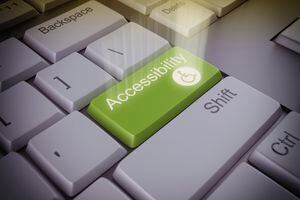'People don't realise the impact of simple day-to-day things'
It is easy to dismiss the need for discrimination legislation when there is nothing preventing you from accessing the facilities, goods and services which most people take for granted.

But comparatively small changes can make a huge difference to the lives of some of Guernsey's most vulnerable residents, as this anonymous writer, who suffers from both visible and hidden disabilities and is a gay transgender man, explains in the second of three articles on the issue...
I WOULD like to talk about disability and how it affects me.
I have an easily-identified disability with my sight because I use a long cane, but I also have hidden disabilities, including autism, and mental and physical health issues.
I often explain the autism as well as my sight, but people ignore this when actually it affects me immensely.
People do not realise how simple day to day things really impact and how disabling these can be.
Here are some examples which I frequently come across:
I asked for the Severe Disability Benefit application form at Social Security to be in an accessible format – they could only provide the standard form and no options (if they could do this online, I could use assistive technology).
Letters that come from Social Security and Housing do not have large print or email options.
If I have to go to Income Support, the waiting room has a video playing to entertain children, noise, people, unknowns – I have asked if due to autism I could book a time for an appointment, but the answer was no.
If I need a doctor’s appointment, I have to be able to communicate and use a phone, physically get there and then sit in a waiting room with lots of people and music on in the background and artificial light, which puts me in autism overload before even dealing with the doctor.
Almost every shop has overhead music (which is not good for autism) and can be quite inaccessible (sight-wise). When asking for assistance this can be quite variable.
People don’t think – I am there with a long cane and get asked if I have a driver’s licence for ID, and people often just say that they don’t make adjustments or ‘forget’ because I seem to manage so well. The reality is that the additional time/effort/concentration means I can be unable to function for some time.
If there is a household issue, I have to be able to phone Housing (which autism-wise I might not be able to do), then when the tradesperson comes, I cannot confirm ID because of my sight.
I used a community centre and the door to the waiting room was usually left open; one week it wasn’t and it was glass so I walked straight into it. I explained to them that convention was that clear glass usually had something on it to help show that it was there. They thanked me for bringing it to their attention, but several months later I went there and there was nothing on that door. They could have simply put a piece of A4 paper up with ‘waiting room’ written on it.
I am waiting for an allocation of a guide dog – there is no legal requirement for anywhere to accept assistance dogs, although most places do. There have been recent instances of guide dogs being turned away from businesses.
Buses have the facility to audio announce all bus stops (on the new buses), but they only announce occasional ones, if the facility is even switched on. Buses are really stressful for sight and autism (although some individual drivers are great, others aren’t). This doesn’t help my independence and mobility.
When at the bank or paying for things using cards, I cannot check the amounts because there aren’t other options so I have to hope that all is correct.
am not asking for huge changes. I accept that there are limits as to what adjustments and accommodations can be made.

A lot of businesses now have live chat facilities online, which works really well for me, as does email (but not if urgent).
A lot of people and businesses already do what they can – and the discrimination law won’t change that or need them to do anything. However, it will give people a way of ensuring that they can be treated equally – if I cannot claim a benefit or get a doctor’s appointment, then this is a problem and it can be addressed really easily.
I would also encourage people to actually ask what it is that I need when I explain my disabilities – there are times when I will need someone to help guide me, when I will need to do things in written format, when I need a quiet corner or an appointment time and when I need accessible documents and I will need you to tell me what to expect and when in terms of autism.
Equally, I have had people apologise for not having something in Braille (which I don’t read) or asking if I would like them to describe what they look like (no – that isn’t going to help me figure out who you are, but talk to me and I will learn to recognise your voice).
A little discrimination training would sort the majority of these issues out and would be something businesses would do if we had legislation.
Part 1, which covered some of the myths and fears surrounding discrimination legislation, was published on Tuesday. Don't miss part three, covering gender identity, next Tuesday.





